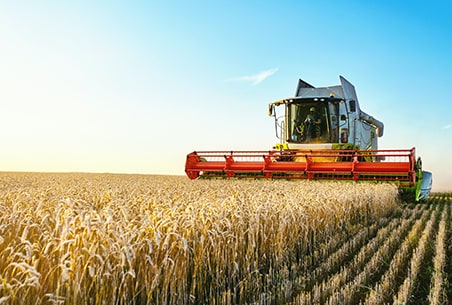

What Truck Drivers Need To Know About Claiming Meal Expenses
How the guidelines have recently changed, and how to claim without getting caught out
If you're a truck driver, you'll have heard that recently the ATO has made changes to the way you can claim meals. After working closely with those in the industry, the ATO has reinstated their previous meal-by-meal claims system. With so much change, it can be hard to keep track of exactly what you can claim, and for how much. That's why we've put it all together to help you keep track.
For starters, how can you claim your meals?
1. You must have been required to sleep on a long or night rest break or for the entire night away from home.
2. Include any travel allowance from your employer in your tax return as income.
3. Only claim the amount that you've actually spent on meals and not been reimbursed.
4. Keep a record.
That all seems pretty straightforward so far. The tricky bit is always keeping track of receipts, since they're small and lost easily, especially on long drives.
Luckily, as long as you're an employee, paid a travel allowance and are claiming less than the ATO's 'reasonable amount' for each meal, you don't need to keep every receipt! You'll still need to keep a record though, since the ATO might ask for evidence that you were actually travelling or to show that you did actually spend that amount.

So what are these 'reasonable amounts'?
The 'reasonable amount' for each meal type set out by the ATO at the moment only cover the 2017/18 financial year, and are the amount reasonably expected that a person might spend on a meal.
Breakfast: $24.25
Lunch: $27.65
Dinner: $47.70
Now, that isn't to say you can have a total of $99.60 for the whole day, and you can't add your leftover breakfast change to your lunch total. Each 'reasonable amount' is only good for that meal type. And if you don't eat on a regular schedule, or eat at unconventional times, you just can't claim more than one type of meal in a 24 hour period (so you can't have two breakfasts and a lunch in the same day). Plus, if you've been using the previous published daily limit of $55.30 and want to keep claiming that way, you won't be disadvantaged.
What do I have to do?
As I mentioned before, you still have to keep records, but the type of records you have to keep will depend on the amount that you're planning on claiming.
If you're only claiming up to the 'reasonable amount', you need:
- Your pay slips, or payment summary from your employer
- Records of the travel allowances you received, in the form of a work diary or other documentation
- Records of the time you travelled for work, including where you travelled to, your start and finish times, and when you stopped to eat.
- Written evidence showing that you were the one who spent the money. While you don't need to keep every receipt, you may have to show bank statements or something similar.
Though, if you travel the same way frequently and have a stable, regular pattern of spending, the ATO will accept written evidence for a three month period.
For example, you're a driver who makes the same overnight drive each week. You spend roughly $19.50 on breakfast, $25 on lunch and $37 on dinners each day, at different locations. You keep your receipts and bank statements for a three month period to verify these numbers.When it comes to tax time, you can use your work diary, with these records, to calculate exactly how many breakfasts, lunches and dinners you had while travelling. With that number, you can calculate exactly how much you can claim, including any travel allowance you receive as assessable income.
However if you've been using the previous daily limit of $55.30, you'll be required to keep records for a month. You won't be disadvantaged if you keep using this method, and you can switch from the previous daily amount to the new meal-by-meal system – but you can't switch from the meal-by-meal system to the daily limit.
If you're claiming over the 'reasonable amount', you need:
- Your pay slips, or payment summary from your employer
- Records of the travel allowances you received
- A work diary or other documentation to verify times you travelled for work, overnight or were required to stop for a long rest break.
- All of your receipts or invoices for every meal you purchased. These need to include details of the supplier or place of purchase, amount spent, date, and the 'nature of the goods or service', which really just means what you purchased.
The ATO might also ask for other evidence, such as bank statements, to prove that you yourself were the one who spent the money.
So there you have it. If you keep these breakdowns in mind, following the new allowances and being able to claim everything you're entitled to, is all too easy. The meal-by-meal system seeks to be better and fairer for truck drivers, with a higher claimable amount per meal and less record keeping needed. Plus, if you would prefer to keep using the previous daily limit system, you won't be disadvantaged either so you can focus on doing what you do best.
Summary
The ATO's recent changes to the way truck drivers can claim meal expenses has moved from a daily limit to a meal-by-meal system, which is better for drivers and means less record keeping. Here, we've unpacked exactly what, and how, you can claim.
Want more information about how you can Claim Meal Expenses under the new system?
If you'd like more specific advice on the new claims system versus the old or on making claims, please call one of our full time offices:
Bordertown (08) 87528888
Naracoorte (08) 8765 7777 or
Murray Bridge (08) 8535 5999
__________
GENERAL ADVICE WARNING | The information contained in this article is general and is not intended to serve as advice. No warranty is given in relation to the accuracy or reliability of any information. Readers should not act or fail to act on the basis of information contained herein. Readers are encouraged to contact a professional advisor for advice concerning specific matters before making any decision.
Related Insights
ATO Tax Agent Consolidation Update
ATO Tax Agent Consolidation Update
ATO consolidating our tax agent numbers by 1 March 2026. Check your ATO communication preferences to ensure your details stay correct.
Where country living meets expert accounting
Where country living meets expert accounting
And under skies like these, great people grow! Explore vacancies at Murray Nankivell, where rewarding careers and exceptional client outcomes go hand in hand.
SBE Instant Asset Write-off
SBE Instant Asset Write-off
Australia extends $20,000 Instant Asset Write-Off to June 2026, giving small businesses certainty, cash-flow benefits, simplified depreciation, and investment incentives.
We are here for you
We look forward to working with you to help you achieve a better financial future. Let us guide you on the path to financial success.
Contact your preferred Murray Nankivell office today.









